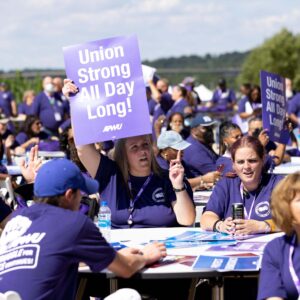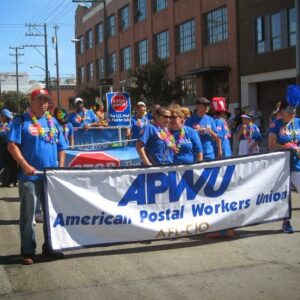October 2, 2018
The National Convention Sets the Path for Current and Future APWU Struggles
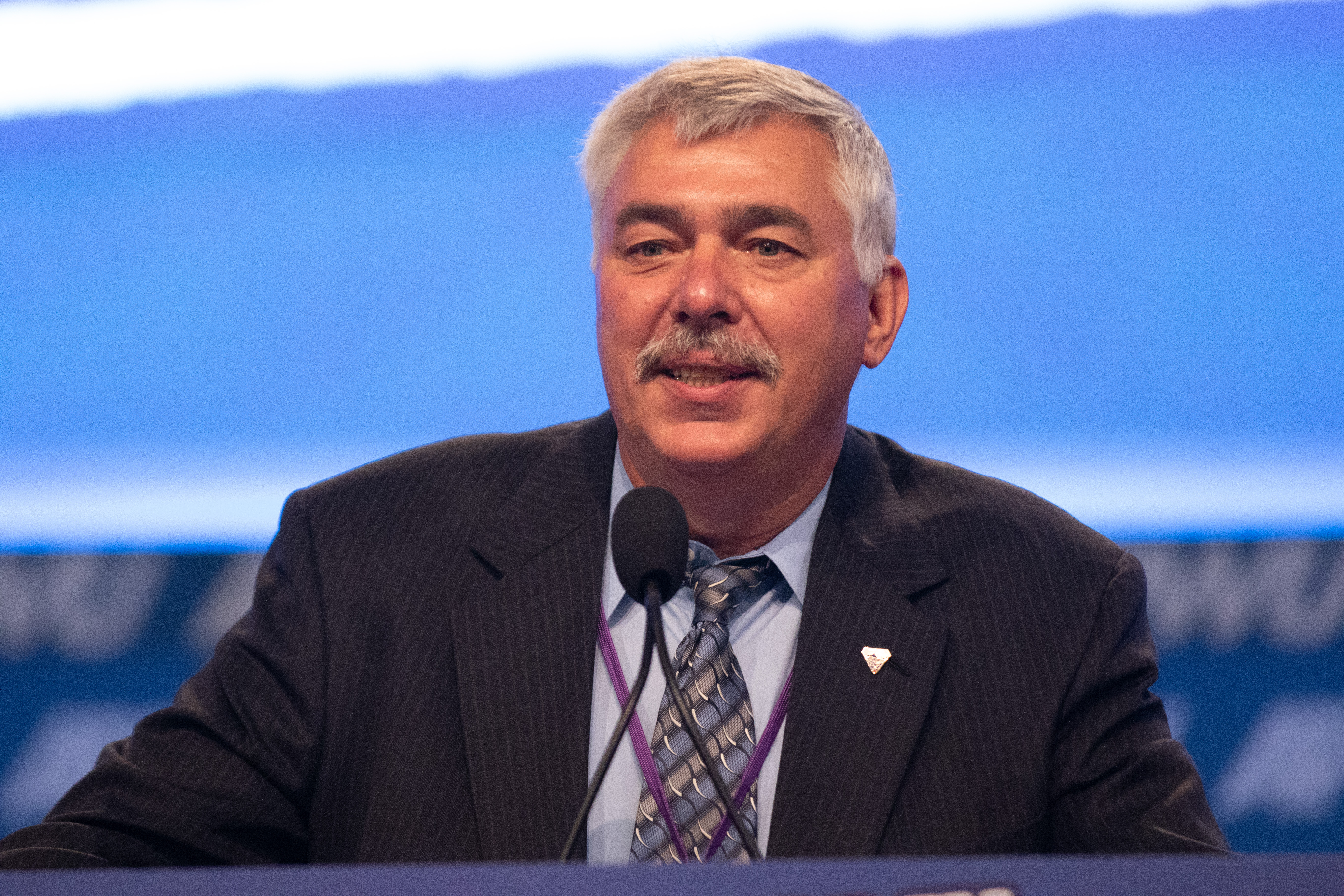
President Chuck Pugar
welcomes the delegates.
 (This article first appeared in the September/October 2018 issue of the American Postal Worker magazine)
(This article first appeared in the September/October 2018 issue of the American Postal Worker magazine)
Twenty-one hundred APWU members departed from the union’s 24th Biennial National Convention in August uplifted, united and ready to continue Fighting Today for a Better Tomorrow!
Four days of rousing speeches, an enthusiastic rally against the privatization of the public Postal Service, as well as vigorous debate over resolutions on work floor topics and social issues reflected the APWU’s spirit of activism and a commitment to strengthen the union.
When all was said and done, the union had publicly opposed rising fascism in the U.S., garnered extensive media coverage of the united fight against the sale of the Post Office to private corporations, displayed solidarity with workers and other allies, and identified additional goals for the next round of contract negotiations.
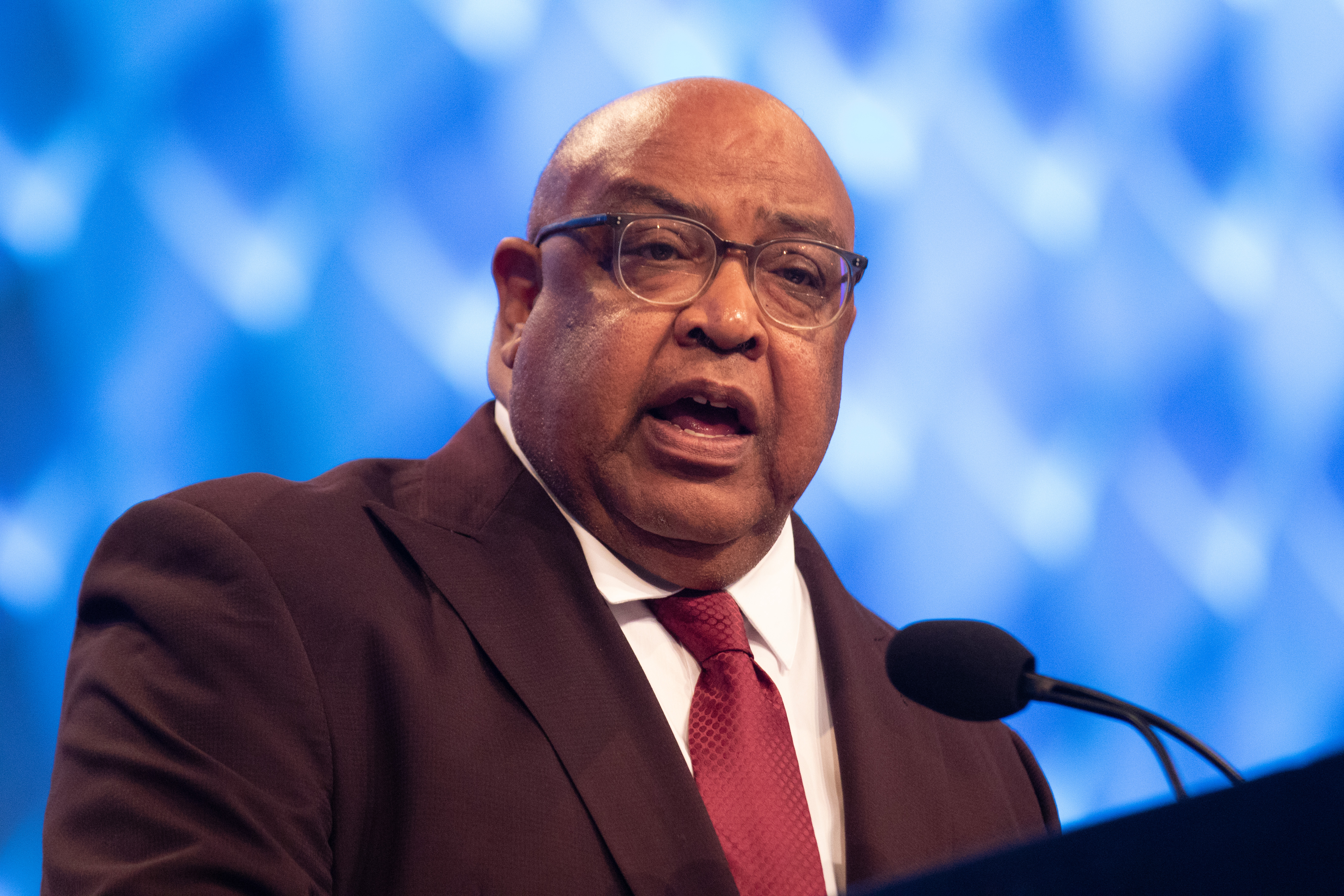
United Steelworkers,
welcoming delegates to Pittsburgh.
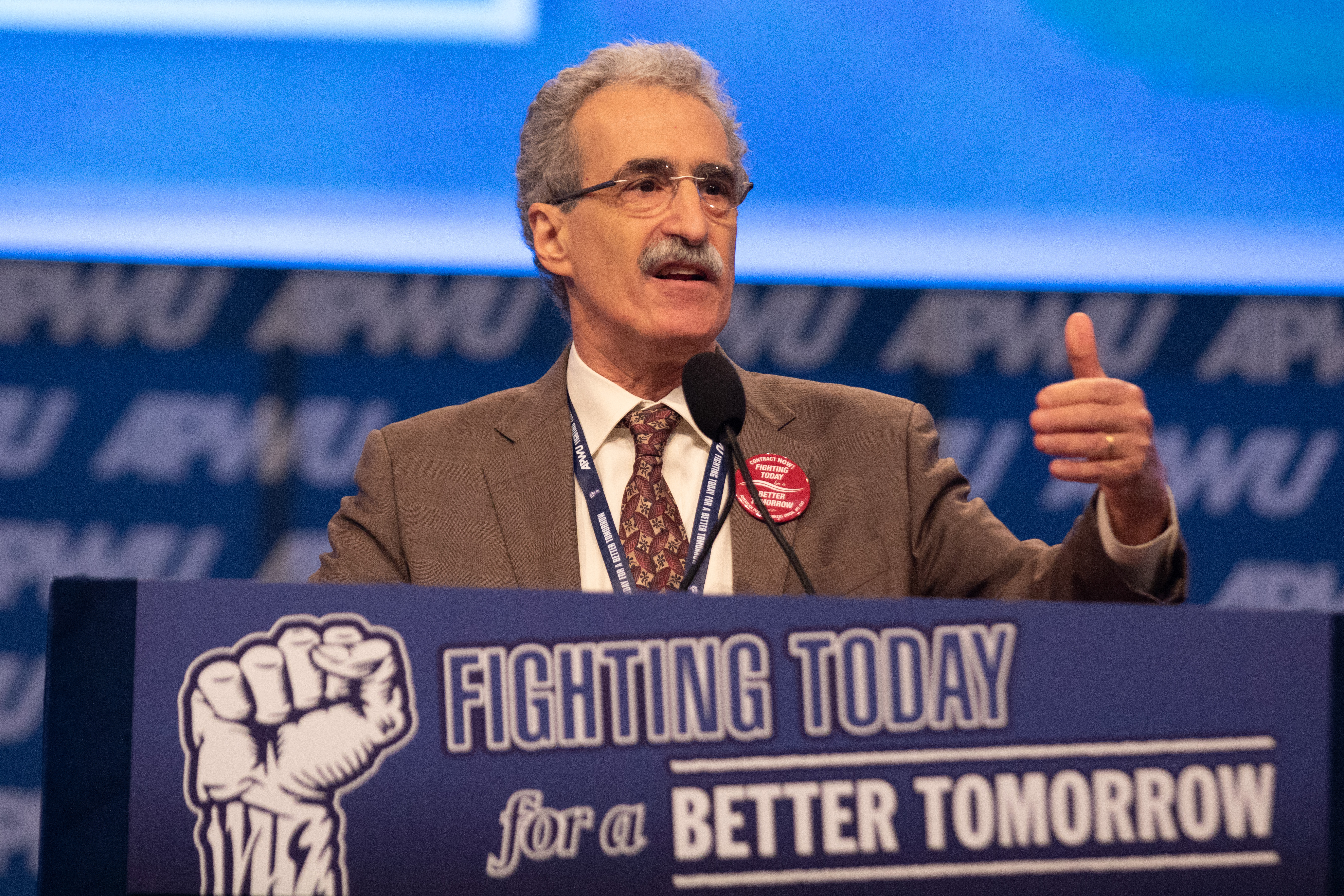
State of the Union keynote address to the delegation.
President Dimondstein inspired delegates with stories of recent labor victories, including the education workers’ strike in West Virginia that sparked similar actions across the country. He stated how recent worker actions were reminiscent of the historic Memphis Sanitation Workers Strike and APWU’s own Great Postal Strike of 1970. “One in five people have joined street protests in the last two years… the needed culture of resistance spreads as we are Fighting Today for a Better Tomorrow.”
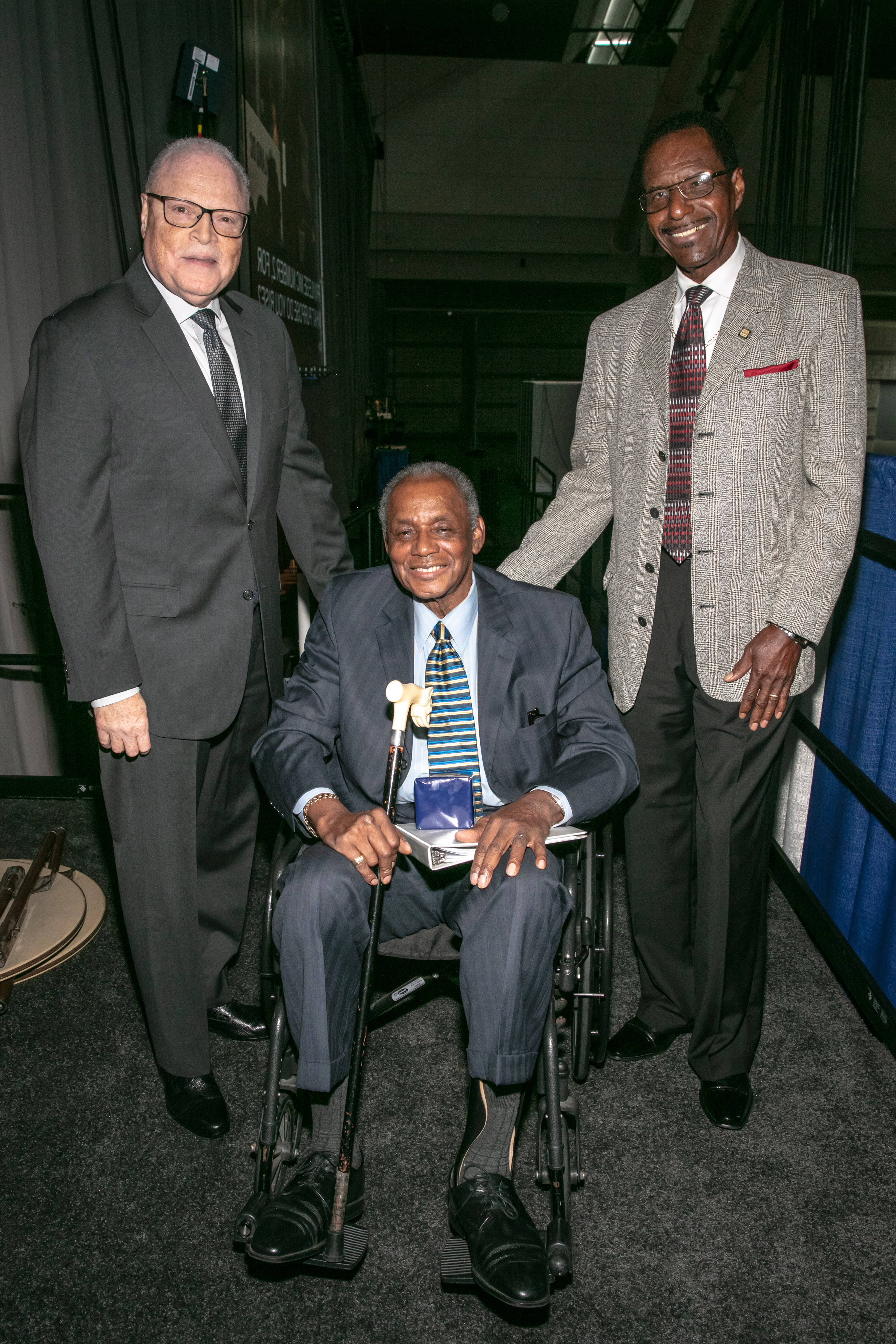
President; Bill Lucy,
Legendary Labor Leader;
Rev. Cleophus Smith.
1968 Memphis
Sanitation Worker
Striker
Delegates Draw Inspiration from Memphis Sanitation Workers Strikers
On Aug. 22, the convention’s third day, the delegates heard from American Federation of State, County and Municipal Employees (AFSCME) leaders about the 1968 Memphis Sanitation Workers Strike. Delegates found inspiration from the integral link between AFSCME and APWU’s past and present struggles, and from the crucial connection between the civil rights and labor movements.
Rev. Cleophus Smith, Memphis sanitation striker and current activist who mentors up-and-coming leaders, reflected on how difficult the years were before the strike, and shined a light on the atrocities faced by the poor black working-class. “It was cold that year,” he said. “We’re out there working with no sufficient gloves, no sufficient clothes, no sufficient shoes… I held on and in 1968 when we went on strike we were out for 65 long days.”
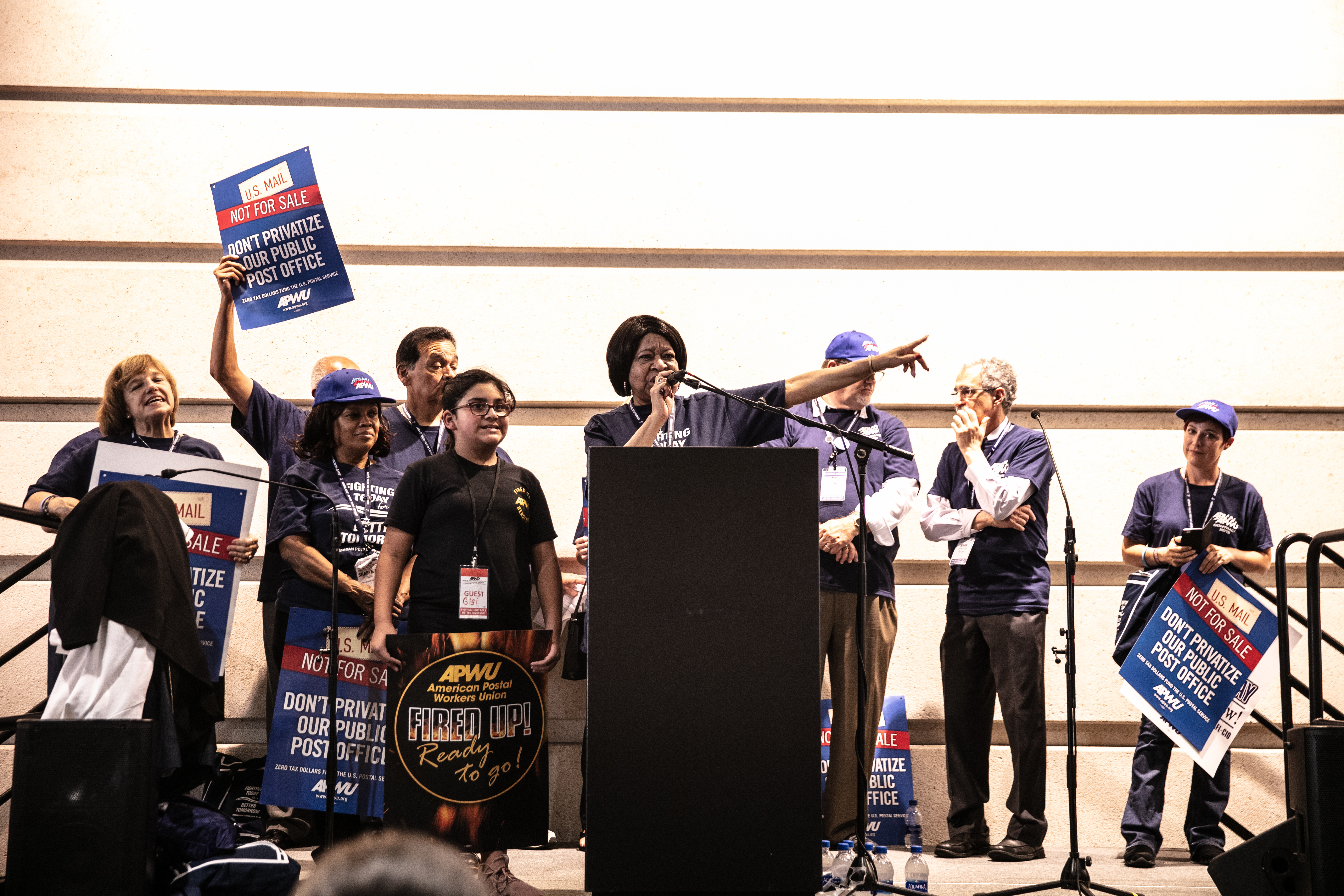
led a roaring chant of “This is What Democracy Looks Like,” firing up the crowd.
William “Bill” Lucy, former Secretary-Treasurer of AFSCME, founder of the Coalition of Black Trade Unionists and member of the APWU Cleveland Area Local, shared his experiences as a leading AFSCME staffer in the historic strike. “We are celebrating this 50th anniversary not as a one-day issue,” Lucy said. “This is an ongoing struggle we should all be engaged in…We have to raise this nation up to give everyone an opportunity to enjoy the fruits of their labor.”
Rising up is precisely what current AFSCME President Lee Saunders encouraged when he spoke to the delegation. “The civil rights and the labor movements had – and still have – common values, as well as common enemies… Dr. King understood all this and he understood we couldn’t have racial justice without economic justice,” Saunders said. “We are in a movement moment. A movement moment that builds on the legacy of the Memphis Sanitation Workers.” 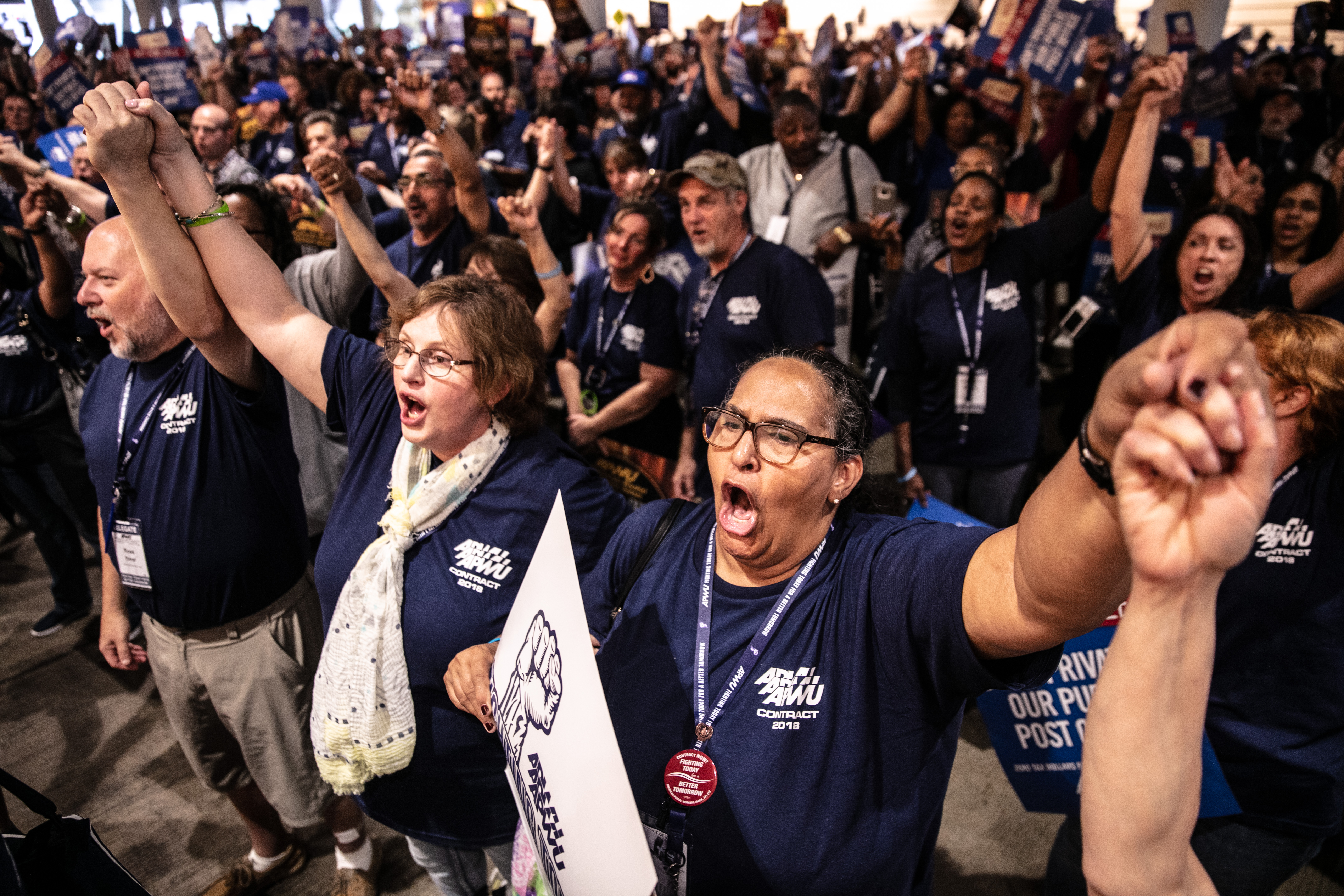
The U.S. Mail is Not for Sale
On Aug. 21, convention delegates hit the streets of Pittsburgh, PA to protest against the possible sale of the U.S. Postal Service.
“This White House, the Heritage Foundation – and their billionaire backers – and Wall Street investors, they want their greedy hands on the public till and the public good – but they’ve started something that they’re not going to be able to stop,” said President Dimondstein.
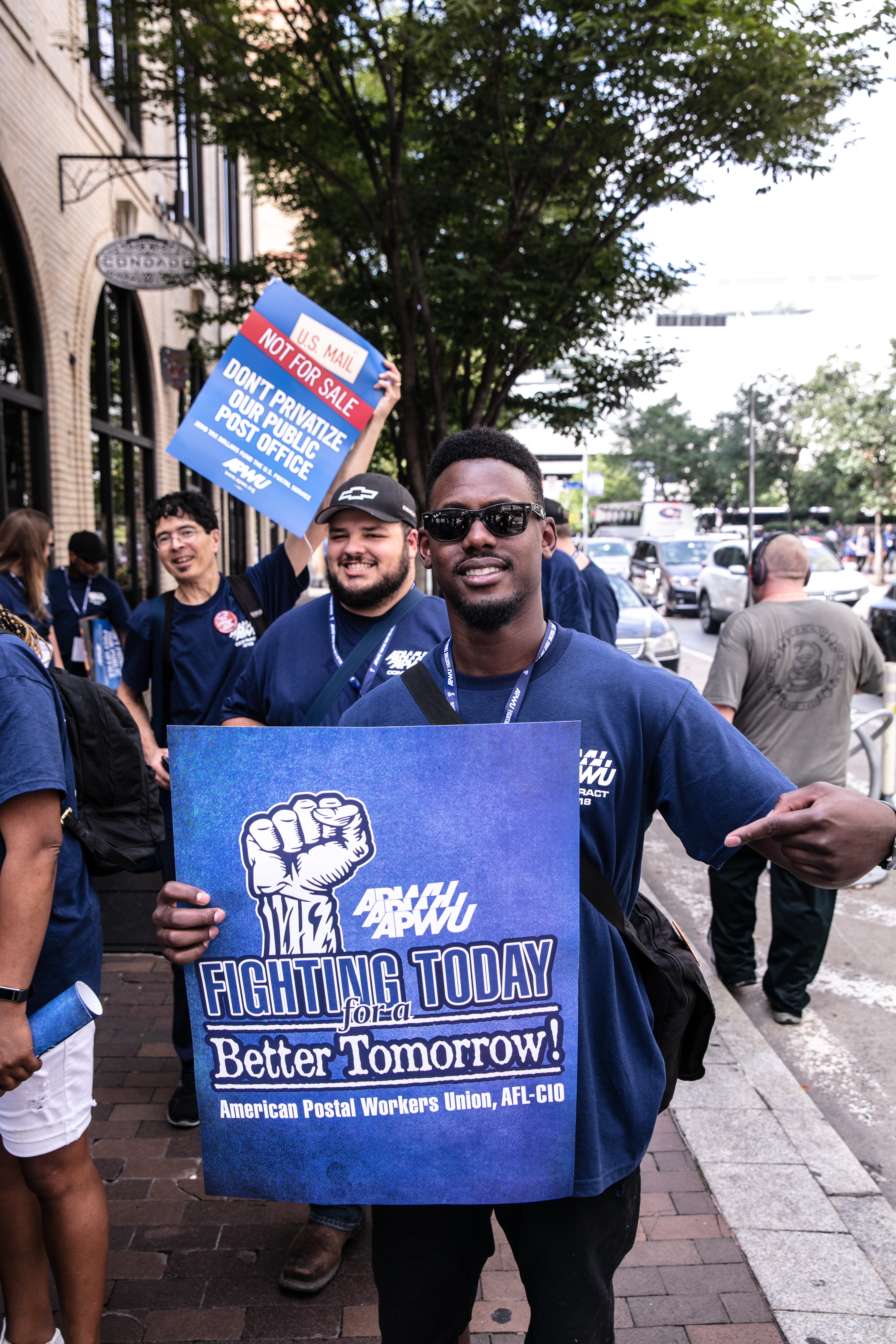
Clerk Craft Director of the Rapid Area Local,
at the Pittsburgh Rally
“They think this is their time… We’re going to show them this is truly our time.” Director of Industrial Relations Vance Zimmerman, rallied the crowd. “They picked on the wrong family, the APWU Family!… And after we save the Post Office, we are taking this country back for working people!”
Legislative & Political Director Judy Beard led a chant of “Whose Post Office? The People’s Post Office.” “That’s the message we are going to send across the United States of America and the U.S. territories,” she continued. “They will not sell our Post Office!”
True solidarity was at the forefront, with leaders and members from several unions – both public and private-sector – legislators and political activists. Speakers included: U.S. Representative Conor Lamb (D-PA-18); Our Revolution President Nina Turner; United Steelworkers District 10 Director Bobby McAuliffe; National Vice-President AFGE District 3 Philip Glover; United Electrical, Radio and Machine Workers of America General President Peter Knowlton; Paul Rozzi from the Pennsylvania State Association of Letter Carriers, NALC; President of the Pittsburgh Labor Council for Latin American Advancement (LCLAA) Guillermo Perez; Association of Flight Attendants-CWA International President Sara Nelson; National Postal Mail Handlers Union President Paul Hogrogian; Head of UNI Global Union Post & Logistics Cornelia Broos, and Canadian Union of Postal Workers President Mike Palecek.
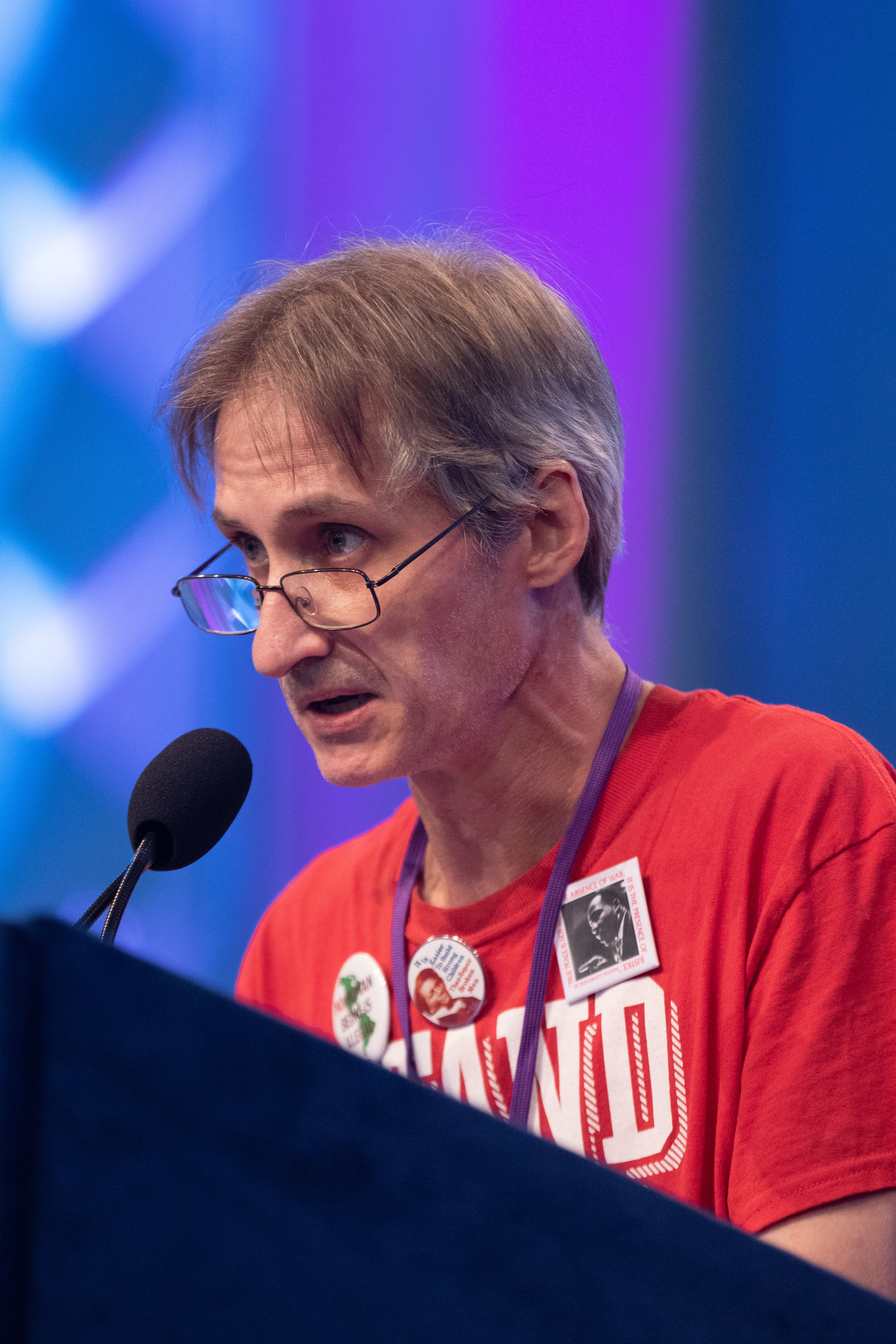
fast food worker
& Fight for $15 activist
Workers Getting it Done
Some of the convention’s most inspiring speakers included workers and local leaders who are out in trenches, fighting the good fight, bringing workers’ issues into the spotlight and moving mountains.
Bill Thompson, the son of an APWU member and a current fast food worker and Fight for $15 activist spoke to the delegation about the struggle fast food workers face every day to pay the bills. He also spoke of the success of the Fight for $15 campaign.
“Unions are the backbone of our society,” said Christine Campbell, West Virginia American Federation of Teachers (AFT) President, when speaking about the teacher strike revolution. “1,200 people join[ed] [the AFT] just during the strike in West Virginia…They’re joining the union! They see value in organized collective action.”
Allies for the Fights Ahead Solidarity was on display at the convention.
Canadian Union of Postal Workers (CUPW) President, Mike Palecek, discussed the CUPW’s strategy to fight against parasitic privatizers in Canada and discussed how it can be applied to the APWU’s fight.
“Like you, we were facing a manufactured crisis that could be solved in an instant, but they have an interest in destroying the services we provide. They needed that crisis to justify their agenda,” he said. Through a strong organization, mobilization and action, the CUPW was successful in restoring door-to-door delivery. 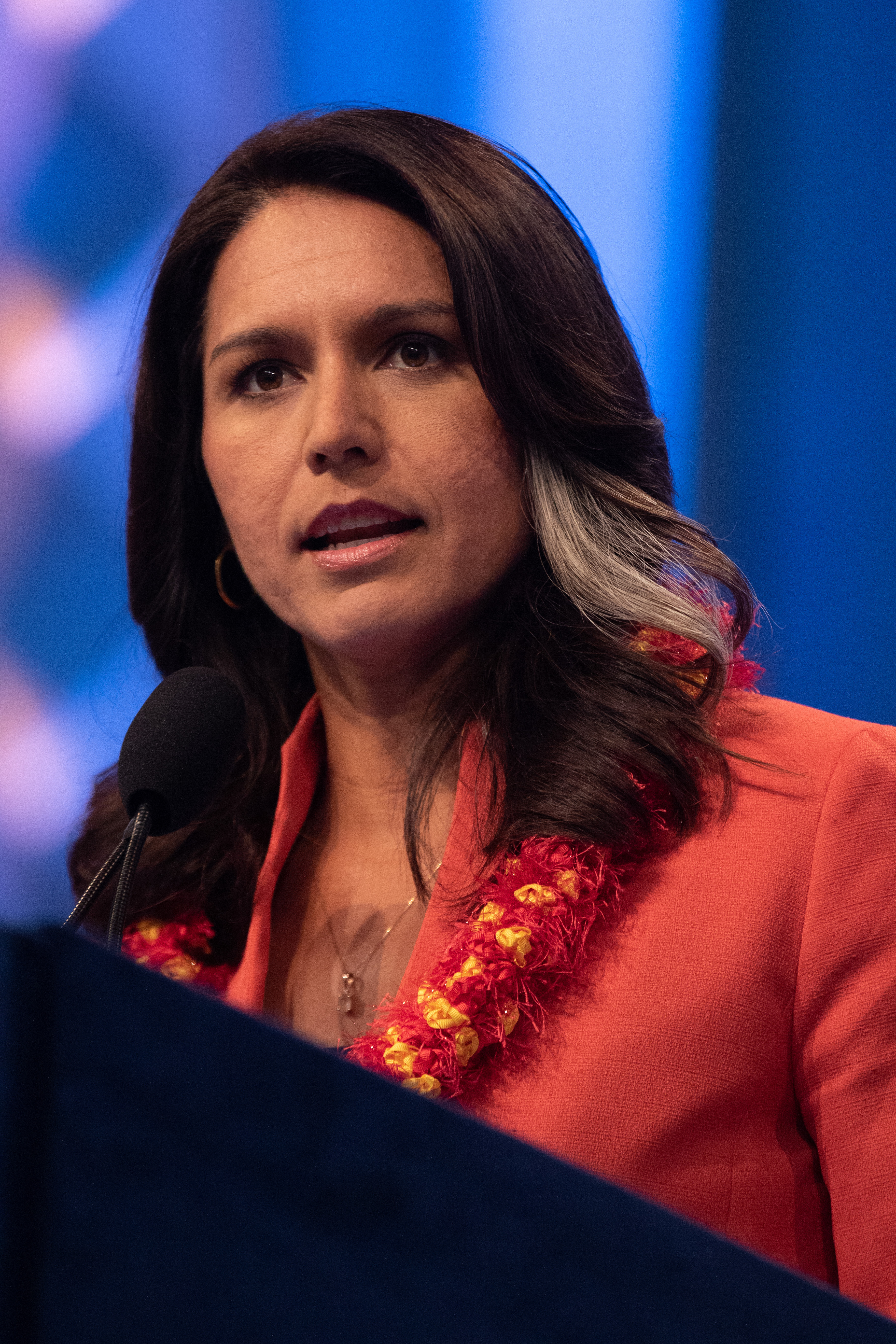
National Association for the Advancement of Colored People (NAACP) President Derrick Johnson told the delegation, “I’ll leave here, sending a message to my members, asking them to call their representative to support House Resolution 993 [a resolution against the sale of the Postal Service] to send a strong message that the Postal Service should not be privatized.”
 U.S. Senator Bernie Sanders (I-VT) was enthusiastically welcomed by the convention delegates on the opening day of convention. He exclaimed, “I will soon be introducing legislation, which I think has a strong chance of passing, that will put the Senate on record in opposition to Trump’s plan to privatize the Postal Service!” He thanked APWU “For helping to lead the fight to create a government and an economy that works for everybody and not just wealthy campaign contributors”.
U.S. Senator Bernie Sanders (I-VT) was enthusiastically welcomed by the convention delegates on the opening day of convention. He exclaimed, “I will soon be introducing legislation, which I think has a strong chance of passing, that will put the Senate on record in opposition to Trump’s plan to privatize the Postal Service!” He thanked APWU “For helping to lead the fight to create a government and an economy that works for everybody and not just wealthy campaign contributors”.
Congresswoman Tulsi Gabbard (D-HI-02), Iraqi War veteran and active service woman, spoke about the cost of war. “Every taxpayer dollar that we spend on these interventionist wars of choice is a dollar we are not spending at home, on health care, on education, on infrastructure, on housing, on the needs of our communities… We all must take a stand for peace to fight to end these wars of choice and instead invest our precious resources on strengthening and rebuilding our communities and our people here at home. ”
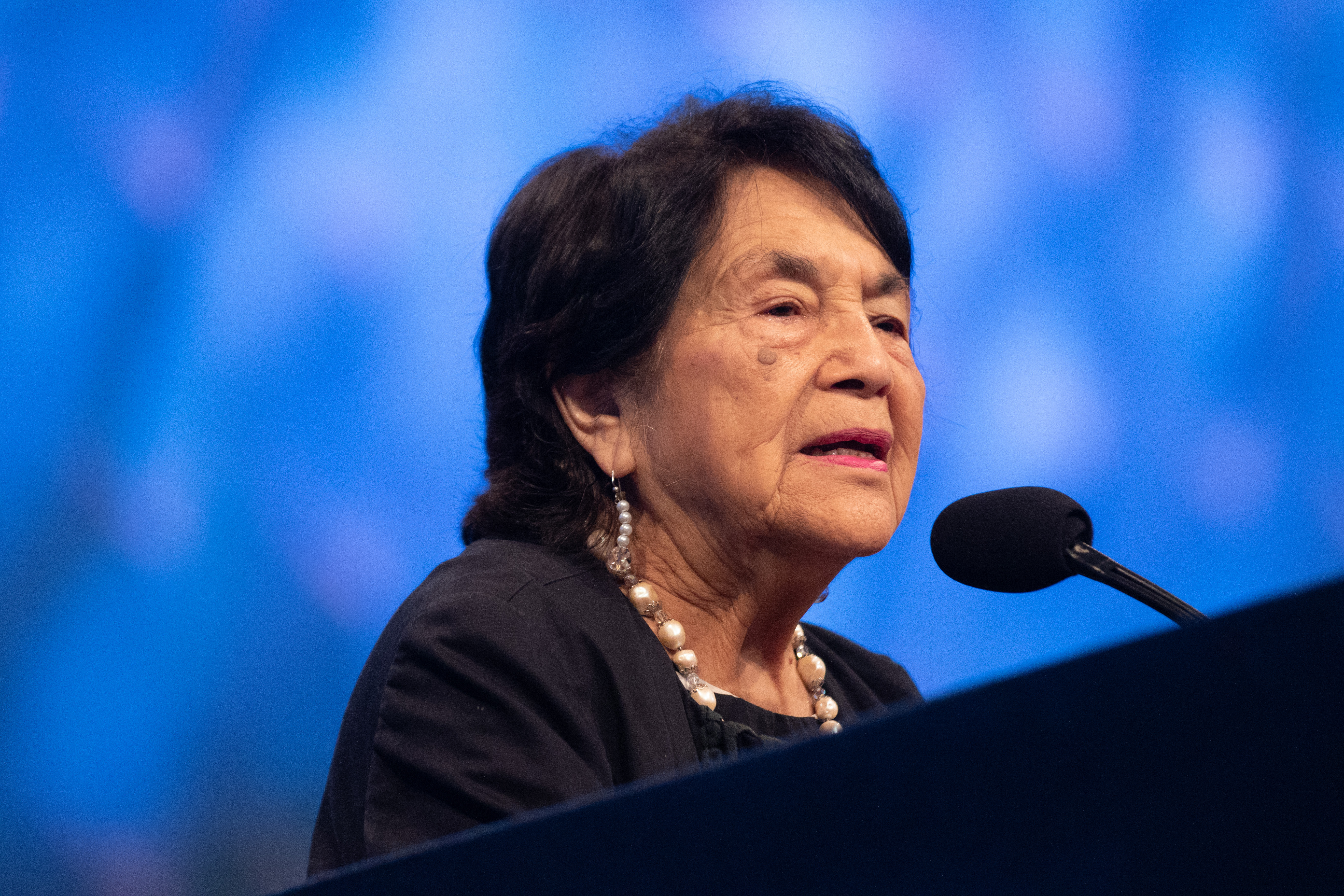
National Farm Workers Association
“Labor, we have to take the power,” said Dolores Huerta, historic labor leader, civil rights activist, and co-founder of the organization that became the United Farm Workers (with Cesar Chavez). “We are one of the few organizations in the United States of America who know how to organize… We need to go out there and walk the streets… We all have to become activists now.”
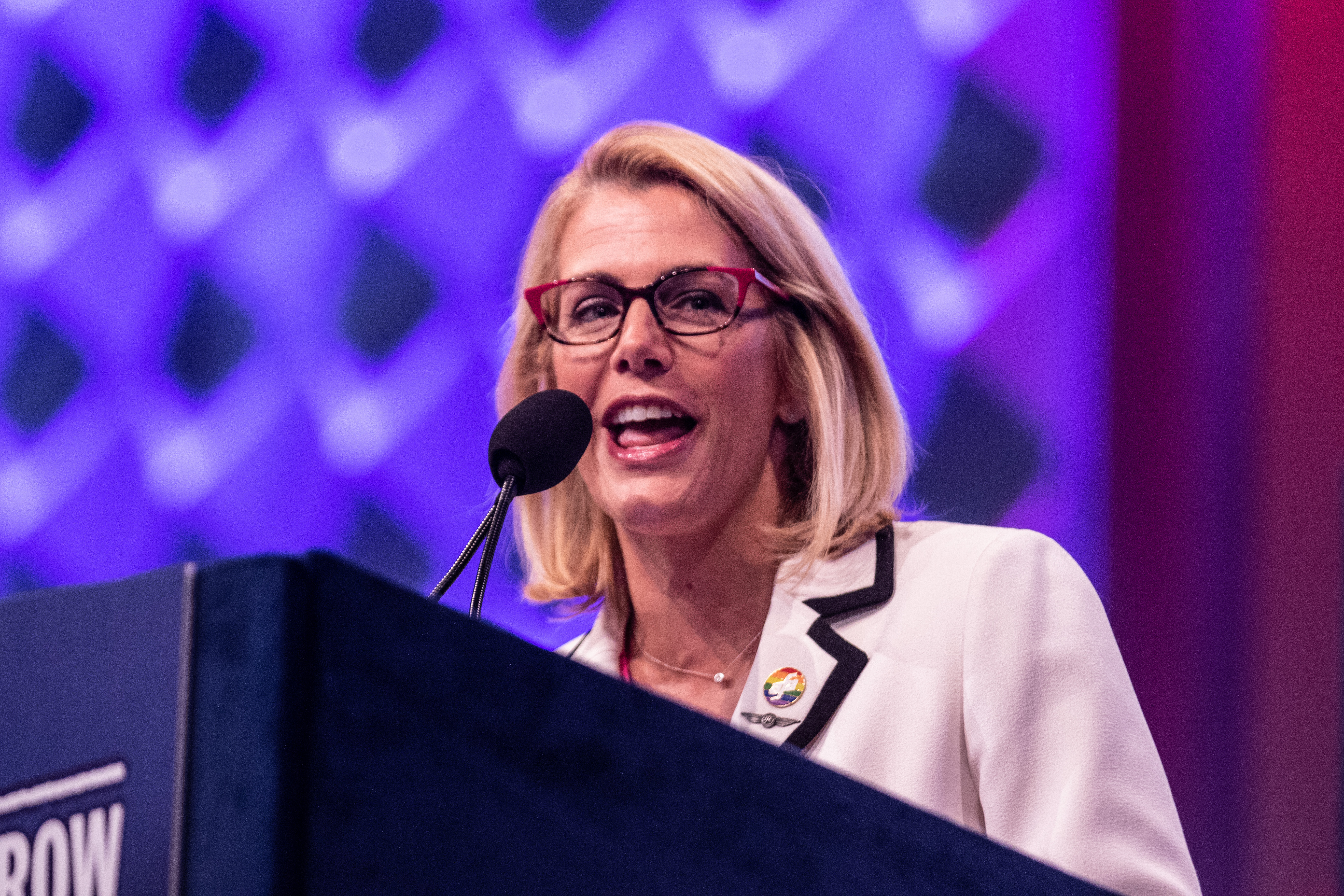
of Flight Attendants – CWA
“We’ve got work to do, APWU,” exclaimed Sara Nelson, International President, Association of Flight Attendants-CWA. “Solidarity is everything… It is unconditional power, hope, family and it can break through every struggle. It is a force stronger than gravity and solidarity will win.”
The Postal Union Alliance is stronger than ever. National Association of Letter Carriers President Frederic Rolando and National Postal Mail Handlers Union President Paul Hogrogian spoke of the need for unity of Postal Unions to save the Postal Service.
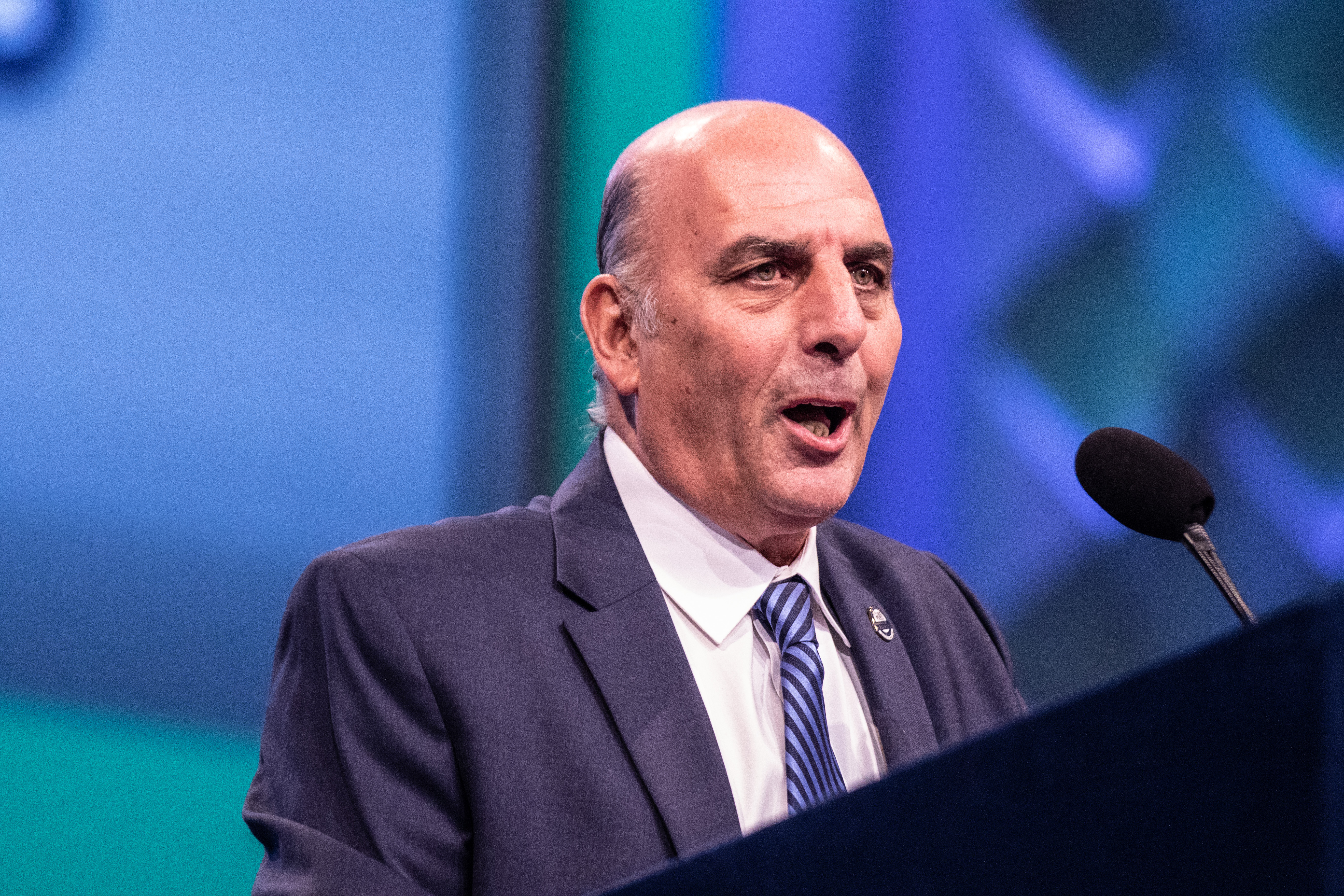
NPMHU President
“We must change the leadership in Congress fundamentally,” Rolando said. “The folks who refuse to act on a bipartisan basis to fix the Postal Service have got to go… let’s mobilize for change.” Hogrogian spoke about how working together, the postal unions can ensure, “that worker-friendly, union-friendly, postal-friendly candidates, regardless of political affiliation, are elected to Congress.”
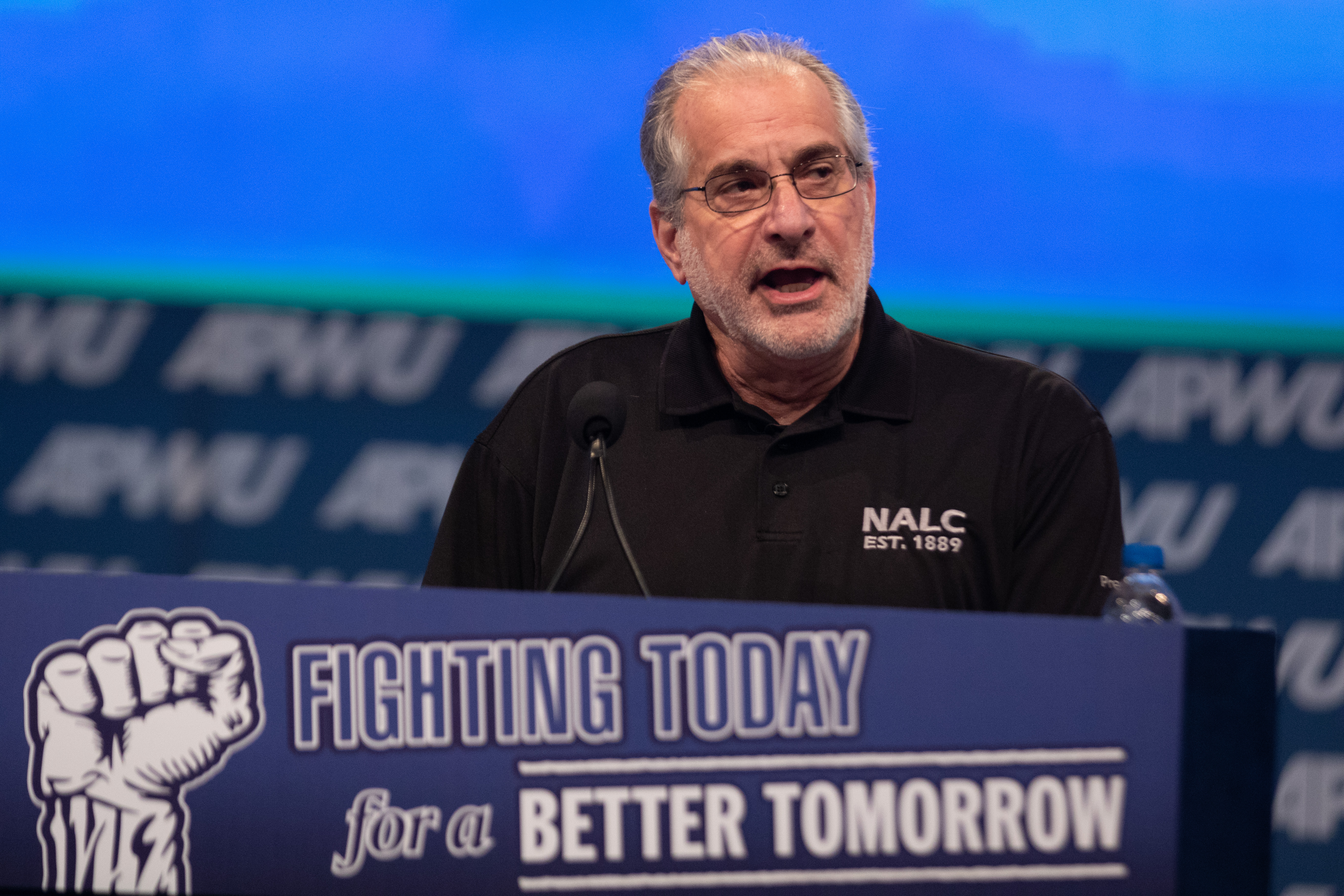
In a fiery speech to convention delegates, AFL-CIO President Richard Trumka attacked the threats to destroy the public Postal Service and postal workers’ jobs. “We are going to fight for the postal service. We are going to defend our unions.”
Cornelia Broos, Head of UNI Global Union Post & Logistics brought solidarity from overseas: “Our 2.5 million postal workers around the world will work together, fight together and we will win together.”
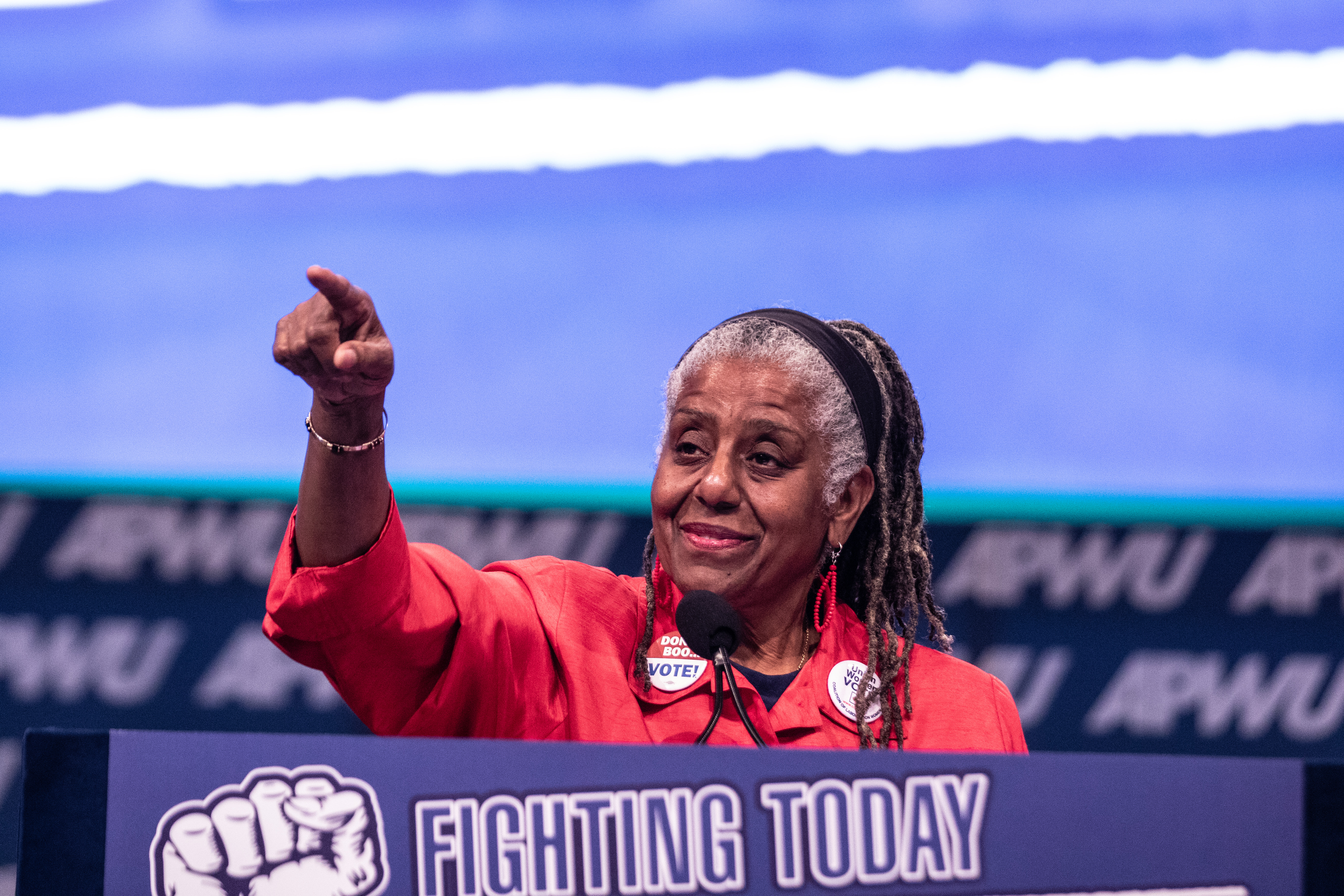
Union Business
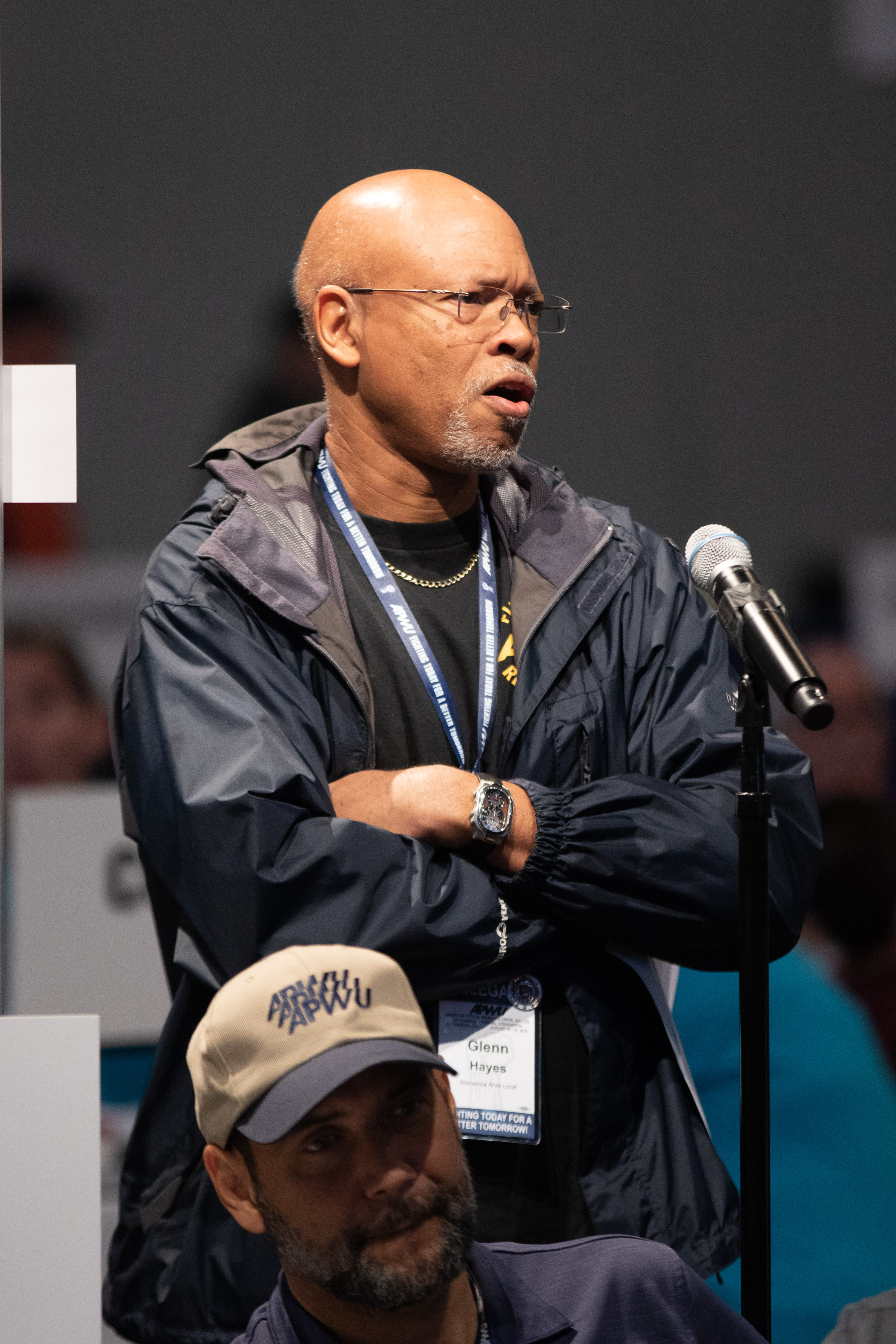
The delegation at the APWU Biennial National Convention is the highest governing body of the union. With the inspiration from the moving speakers, delegates spent most of the convention discussing, debating and voting on resolutions on behalf of the APWU members they represent.
The Constitution Committee reported on a resolution later adopted by the delegates providing for an up to 1,000-word candidate statement to be published in a special election issue of The American Postal Worker and included in the same envelope as the ballot for the national election of officers sent to every member’s house. Previously, a candidate had the opportunity to submit a campaign statement of up to 300 words that was published in a regular issue of The American Postal Worker magazine.
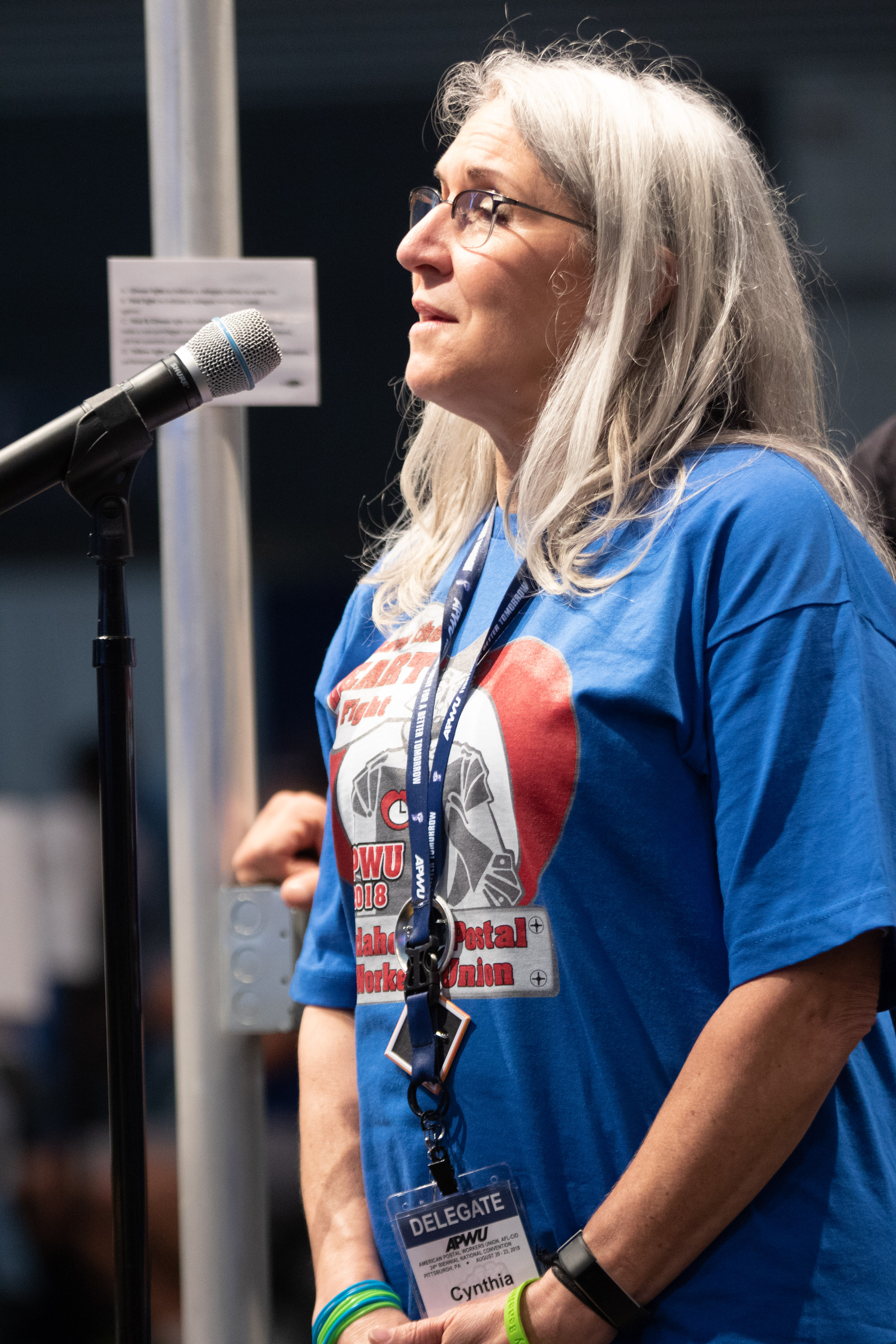
Another constitutional resolution the delegation debated was whether to or not change the retiree national convention delegate representation at the convention. While the delegates voiced strong appreciation and support for the activism of the retirees, the delegates voted for no change in the retiree representation based on the view that beyond the five elected retiree national convention delegates, full voice and vote is based on full membership.
The convention adopted Labor-Management resolutions concerning work hours, Postal Support Employee (PSE) and Non-Traditional Full-Time (NTFT) conversions, overtime and seniority.
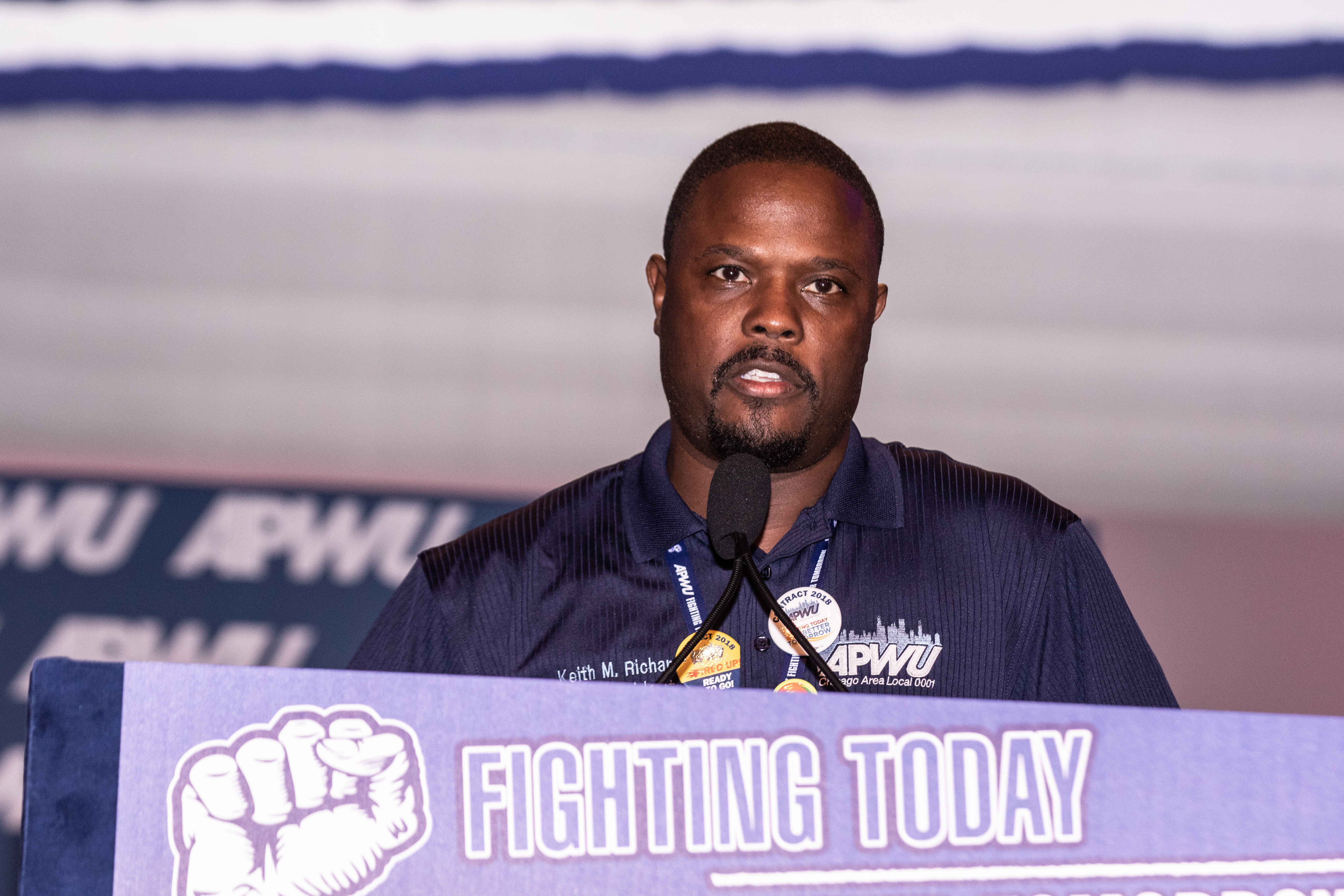
Labor-Management Committee Co-chair
Delegates also acted upon a number of resolutions primarily concerning proposals for future contract negotiations; such as: annual and sick leave, Postal Support Employee (PSE) health benefits, clothing/uniform allowance, workplace harassment/sexual harassment, representation, PSE maximization, and seniority and the rights of deaf and hard of hearing employees to certified interpreters for important job-related issues.
A resolution calling for a light duty/pregnancy policy in the workplace that would assist employees before, during and after childbirth based on the Pregnancy Discrimination Law of 1978 was also adopted. Included in the law are anti-discrimination provisions, workplace accommodations and job protections.
After conclusion of the Labor- Management Committee report, the Legislative/Political Committee presented eight resolutions for the delegates’ consideration, including: Retirement, voter registration, PSE contributions to Thrift Savings Plan, civic engagement and healthcare justice.
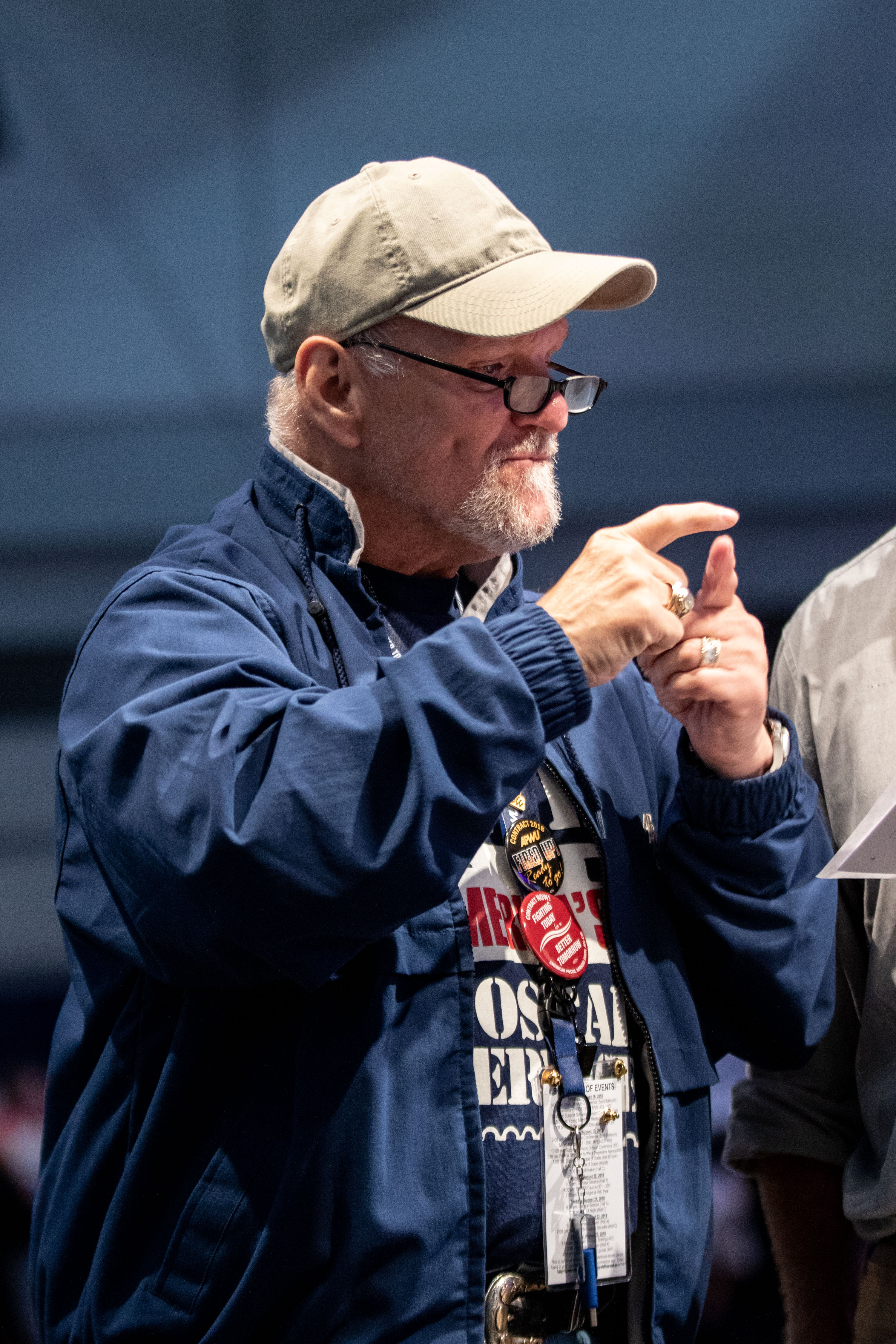
delegate, Aulby Gillett
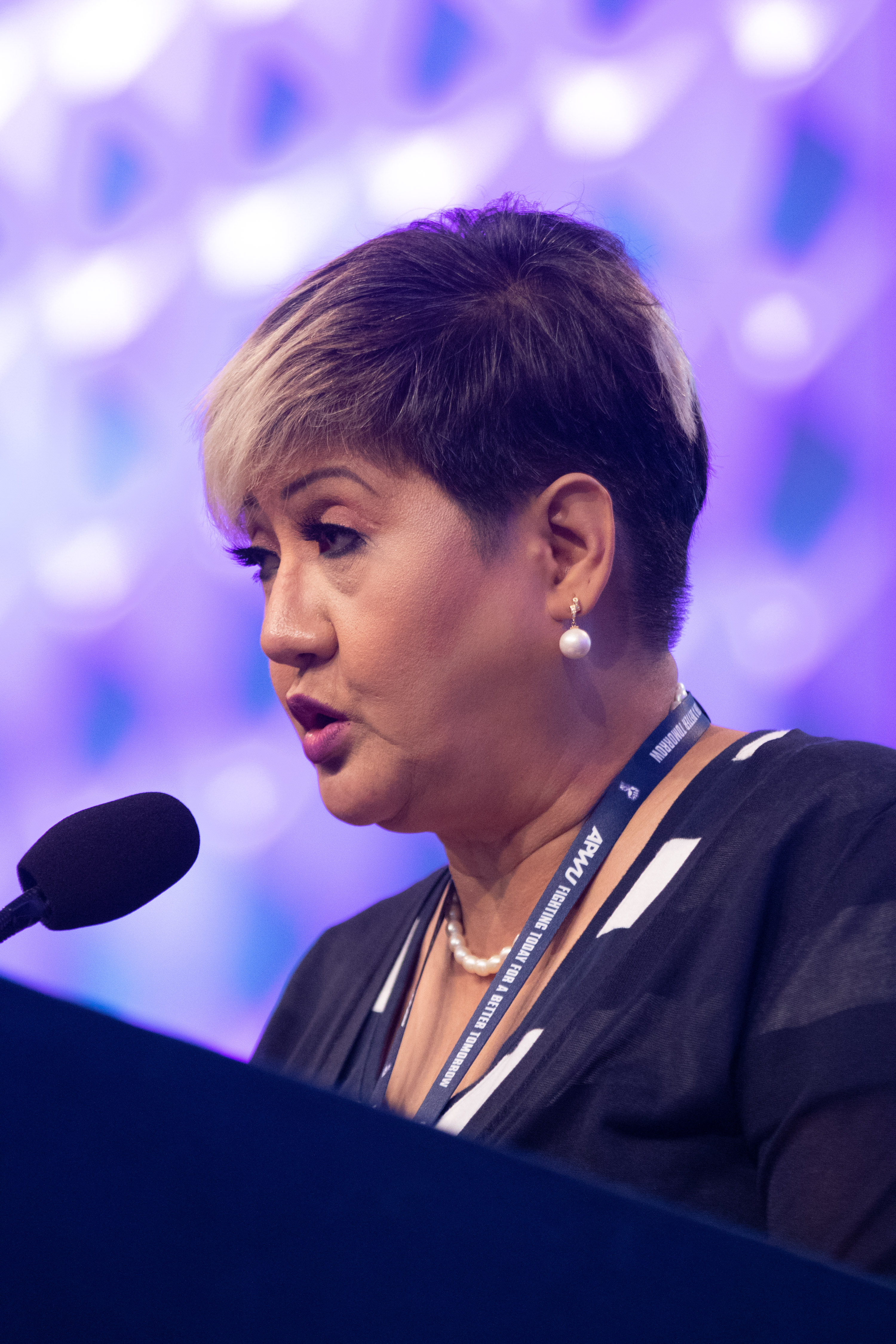
Labor-Management Committee Co-chair
Organize the Unorganized is another resolution the delegates supported. It calls for the APWU national to “reenergize the movement to unionize the private sector,” and “return to organizing the unorganized.”
Delegates unanimously adopted a resolution opposing privatization of Veterans Administration health care. They also adopted a resolution calling for the APWU and its local and state organizations to start an active community involvement program locally, regionally and nationally to promote social and economic justice.
Delegates adopted a resolution that called for full government support for the Puerto Rican people and their post hurricane plight.
The convention gave moving tribute to recently deceased President Emeritus Bill Burrus and Maintenance Director Steve Raymer.
Activism Beyond the Convention
The course is set for the work of the national officers for the next two years. The delegates are primed to go back into their communities across the country and organize the membership and allies into a powerful force.
APWU members can draw strength from our many victories of the past two years – like stopping Staples in Jan. 2017. “We are building unity, enthusiasm, union pride and community support that will help strengthen our everyday battles for workplace justice and defense of the public Postal Service,” said President Dimondstein.
The first action for APWU members to show the country our combined worker power, will be the Oct. 8 National Day of Action against privatization. Click here to find out how you can participate in the nationwide protests.
APWU members should also contact their Congressional representative (1-844-402-1001) and urge them to oppose the sale of the Post Office by supporting and co-sponsoring House Resolution 993.
“The fat cats always underestimate the power of the 99%,” said President Dimondstein. “Their attacks present an opportunity to educate and unite with the people, defend the wonderful national treasure and DEFEAT our enemies.”
Building Worker Power Before the Gavel Dropped
Panel Explores Development of A Workers’ Agenda
On Aug. 19, the Legislative & Political Department hosted a first-of-its-kind panel, “Political Strategies to Win a Progressive Agenda.” The panel discussed how to build a broad movement toward a political agenda that builds worker power.
Legislative & Political Director Judy Beard explained how the new-age robber barons, “are taking back everything that we have fought for and won over the years… We have to fight back.”
Panelists included National Vice President of the Canadian Union of Postal Workers Jan Simpson; APWU Solidarity Representative and retired letter carrier Richard Koritz; past Raleigh Area Local president, labor educator and activist Ajamu Dillahunt; fastfood worker and Fight for $15 activist Bill Thompson; Puerto Rico Area Local member and activist Angieliz Coloncres, and New York Metro Area Local Communications Director Chuck Zlatkin. Each gave testimony on their experience fighting for better communities, better jobs, and an economy that works for all people, not just big business.
“Each panelist understands that workers need power,” Koritz explained. “To have power, we need allies and this is what this panel discussion is about.”
Pre-Convention Workshops Teach Valuable Skills
Over 1,000 members took part in workshops and trainings held on Friday, Aug. 17. Twenty-nine different classes were organized by the Research and Education Department. This year’s workshops included information about contract administration, veterans’ benefits, labor law, retirement planning, union communications, family and medical leave, labor history and empowering young workers. Members left their workshops with new tools to strengthen the union – from the shop floor to the streets – and Fired Up and Ready to Go.
Young Members Are Fired Up and Ready to Go!
On Aug. 18, the Young Members Committee (YMC) held their first official convention conference. Representatives from each region addressed the caucus. Sabrina Larsen presented the introduction of the YMC report. Joshua Gray gave an account on youth activism in today’s society, from environmental fights to gun violence and the difficult legislative battles ahead for a vibrant public post office. Courtney Agee provided remarks on how to get young members involved in union activities. Luis Ramos concluded with statistics and data on mobilizing, organizing and growing activists on postal issues, labor issues and issues impacting the 99%.
Craft Conferences Address Pertinent Issues
On Aug. 18 and 19, APWU craft divisions – Clerk, Maintenance, Motor Vehicle Service, and Support Services – as well as retirees held conferences. The ongoing contract negotiations was on everyone’s mind.
The conferences opened with reports from their respective directors and assistant directors on the union’s past two years. National Business Agents presented information on recent grievance cases affecting their jurisdictional areas. Resolutions were then considered by conference attendees.
Productive Retiree Conference
Some issues of concern for retirees were defense of benefits, medicare, Social Security and the Post Office.

